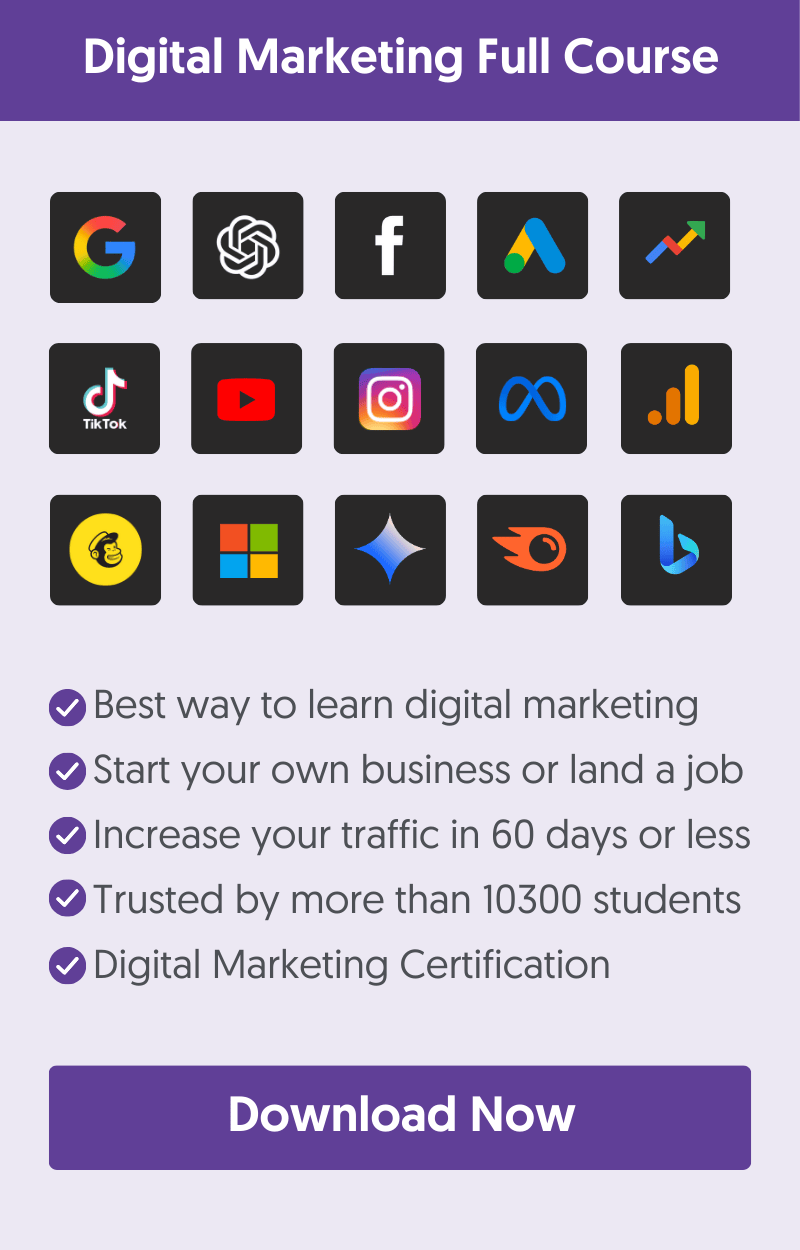Succeeding in digital marketing requires creativity, analytical thinking, and strategic planning. It’s a career that offers exciting opportunities, strong earning potential, and constant innovation but also demands dedication and adaptability.
In this post, you’ll discover the key responsibilities of a digital marketer and practical steps to start your career in this dynamic industry.
What is a Digital Marketer?
A digital marketer is a professional responsible for promoting a business and its products using digital channels, including social media platforms, search engines, and websites.
Digital marketers have extensive knowledge of reaching audiences through multiple platforms, creating content and campaigns for the entire buyer journey.
Digital marketers can work for specific companies, within agencies, or freelance.
Some professionals offer general support with a wide range of marketing activities, while others take a more specialist approach, focusing on tasks like SEO or social media.
Digital marketers must be experts at research and analysis and at creating and implementing marketing campaigns. They must understand everything from marketing budgets to data analytics to ensure their efforts deliver ROI.
What Does a Digital Marketer Do?
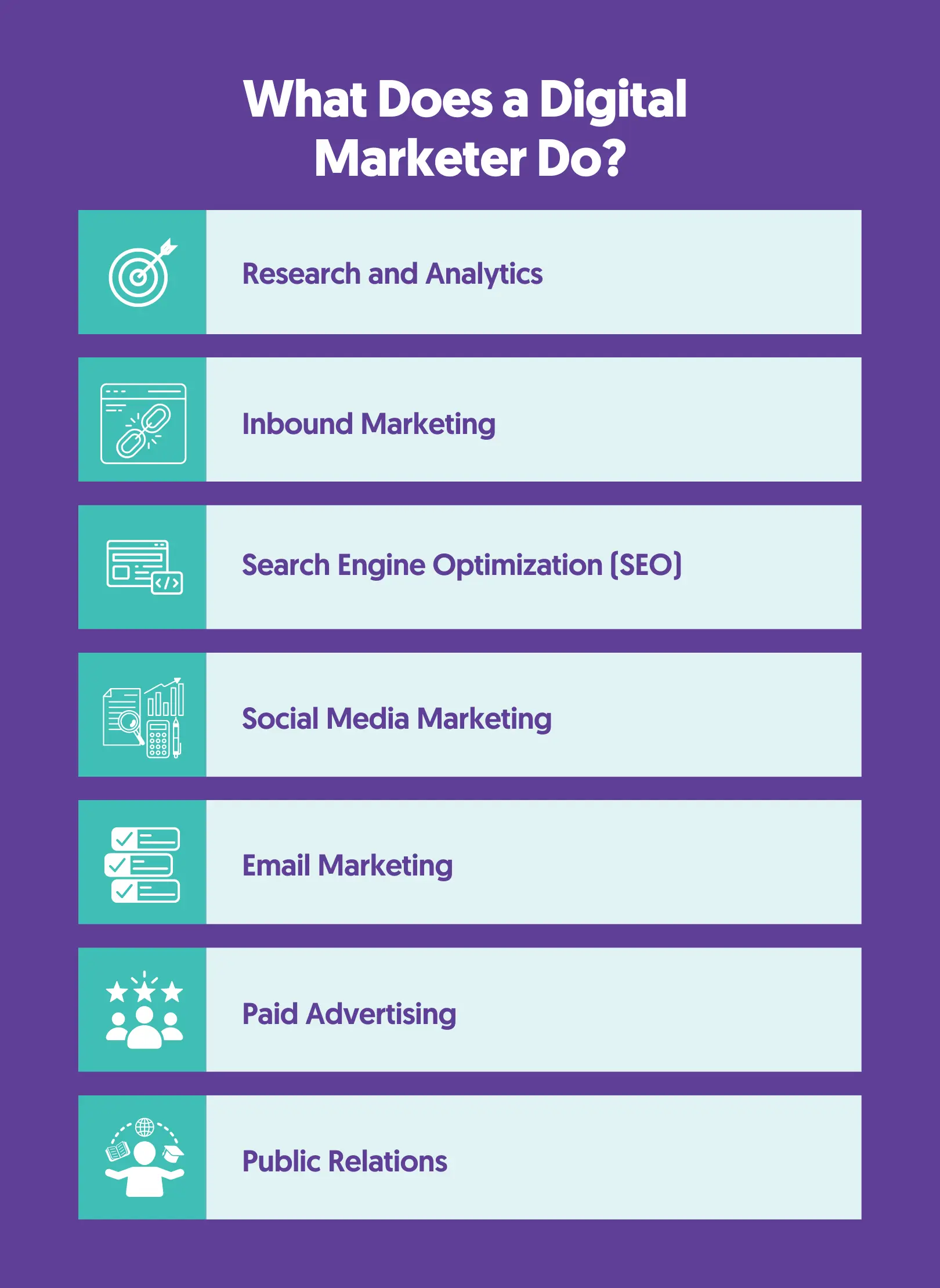
As the digital world continues to evolve, the role of a digital marketer has grown more advanced.
While some professionals do focus on specific tasks, such as email marketing, many have broader responsibilities that cover components of the entire marketing strategy.
A digital marketer's core responsibility is to generate leads and drive brand awareness for a business using various promotional channels.
These professionals may spend their days updating, creating, and posting content, monitoring social interactions, or conducting in-depth market and customer research.
Everyday responsibilities of a digital marketer include:
- Research and analytics: Digital marketers aim to capture the attention of a specific audience, using in-depth research into customer preferences and purchasing behaviors. They conduct market, competitor, and customer analysis and report on the results of each campaign to ensure efforts can be consistently optimized.
- Inbound marketing: Many digital marketers focus heavily on inbound marketing efforts, such as content marketing and search engine optimization. They create interesting and useful content, such as blog posts and articles, and tailor their campaigns to different levels of customer intent.
- SEO: Speaking of SEO, many digital marketers focus heavily on search engine optimization processes, such as researching keywords or building backlinks. They may also assist with optimizing websites through technical, on-page, and off-page SEO efforts to boost a company’s online presence.
- Social media marketing: Via social channels like Facebook, LinkedIn, and Instagram, digital marketers connect with audiences, build brand awareness, and sometimes even interact with customers. They create both organic and paid campaigns for different use cases.
- Email marketing: With email marketing strategies, digital marketers collect leads for business leaders and nurture consumers throughout the purchasing cycle. They create automated campaigns, segment customers, and work on boosting engagement levels between brands and their audience members.
- Public relations: Some digital marketers are involved in their company’s efforts to obtain “earned media” coverage from publications. They might submit press releases to other websites or arrange for interviews with influencers.
- Paid advertising: Many digital marketers may also create paid advertising campaigns, create marketing budgets, and optimize bids for different channels. They may create copy for paid ad campaigns, monitor results, and unify both organic and paid strategies to optimize results.
How to Build Your Digital Marketing Skills
- Study Digital Marketing and Get a Related Degree
- Enhance Your Knowledge Using Online Courses
- Obtain a Digital Marketing Certification
- Get a Job as a Digital Marketing Intern
- Practice on Your Own Online Properties
- Build Expertise in One Area of Marketing
- Network With Other Marketers
- Keep Learning New Skills
1. Study Digital Marketing and Get a Related Degree
Many employers searching for digital marketing experts today aren’t particularly concerned with a professional’s formal education.
You can launch your career in this industry without a specific degree. However, taking a college course connected to digital marketing can be helpful. It offers an opportunity to enhance your skillset and differentiate yourself from other job candidates.
A bachelor’s degree in digital marketing, marketing, journalism, advertising, business, or communication could help you access a wider range of high-paying roles in the digital marketing landscape.
These degree programs also provide opportunities to improve your soft skills in communication and collaboration, which can be handy in a range of roles.
The Bureau of Labor Statistics notes a bachelor’s degree is still necessary for many high-level advertising and promotional positions.
However, you can also consider shifting into digital marketing using another degree.
Professional certification in areas like computer science, economics, and statistics can be helpful when tackling the analytical side of marketing.
2. Enhance Your Knowledge Using Online Courses
Even if you already have a degree in a field related to online marketing, taking digital marketing courses can be extremely useful.
Many courses come with actionable advice and tips you won’t find in a degree program. You may learn more about how to manage specific marketing platforms and channels. You can experiment with different techniques for PPC and social advertising.
Plus, you’ll be able to network and learn from other marketers as you improve your skills. Options in the online course landscape range from fast-paced boot camps with hands-on projects to comprehensive online programs.
There are a variety of free and paid courses available to choose from online. Many of these programs can also be taken at your own pace.
3. Obtain a Digital Marketing Certification
A digital marketing certification makes it easier for industry professionals to demonstrate their expertise in a specific area.
Some of the most popular certifications today come from reputable companies like Google and Meta.
They provide an opportunity to expand your skills even further and enhance your portfolio with examples of your work.
The certifications and digital badges you’ll earn for your resume and LinkedIn profile will help to distinguish you from other candidates in your field.
Plus, with the right certification, you can showcase your commitment to learning and constant improvement to future employers. In the fast-paced marketing world, certifications can even be more valuable than an official degree.
Digital marketing certifications can also offer a unique opportunity to focus your skills in a particular area. You can become certified in “PPC campaigns”, Google Ads, analytics, or even YouTube advertising.
4. Get a Job as a Digital Marketing Intern
Once you have gathered as much knowledge as possible about digital marketing through programs and courses, the next step is gaining real-world experience.
Many employers value practical experience more than formal education. An internship will allow you to practice the skills you’ve learned in a structured setting with continued guidance and support.
With an internship or a basic entry-level role as a digital marketer, you can develop your portfolio and learn more about which parts of the industry appeal most to you. You may even choose your specialization based on your experience.
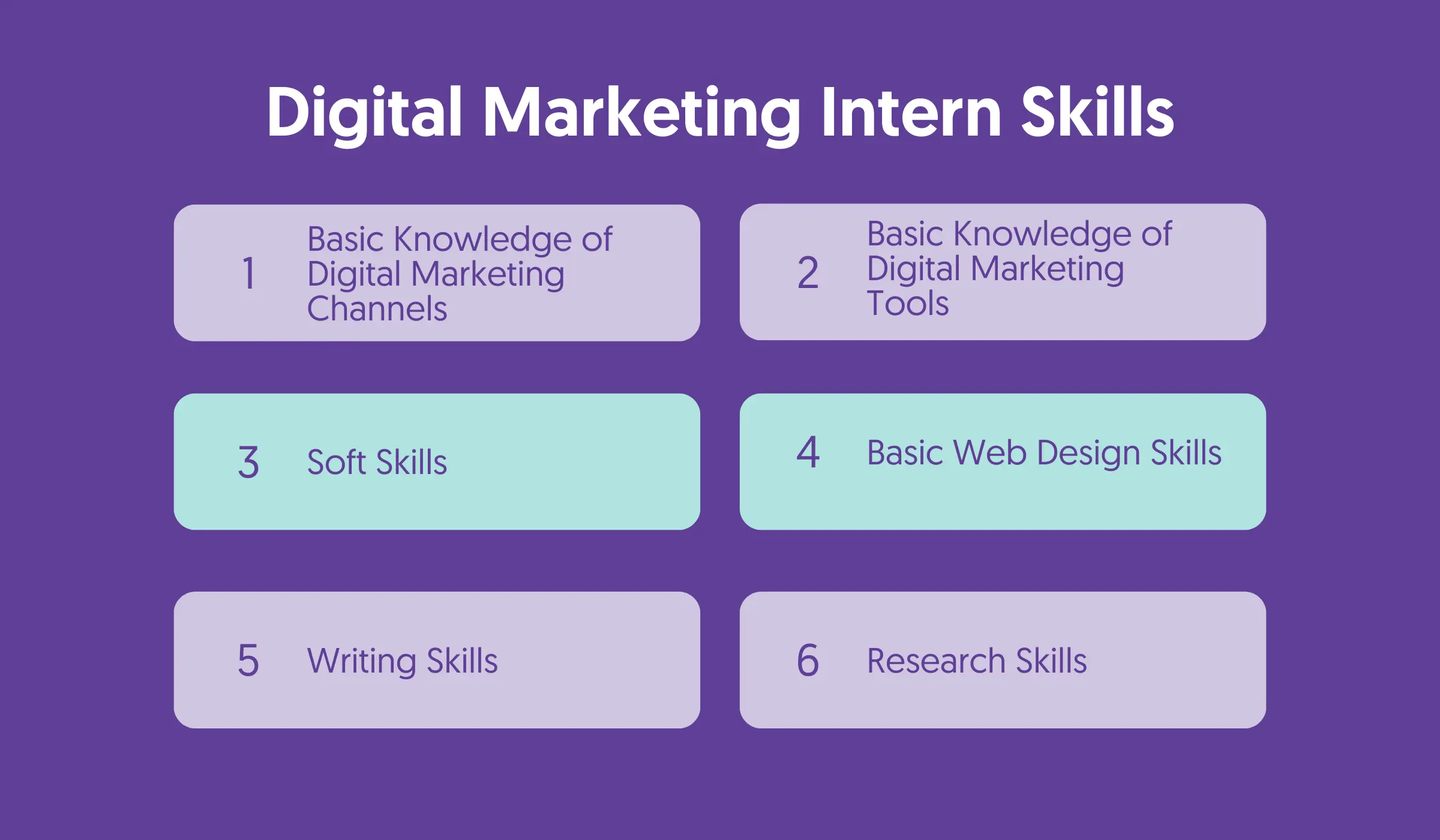
An internship will give you a chance to network with other marketing professionals. You can even shadow other team members to learn from their experiences.
You can gather feedback from business leaders, develop your confidence, and interact with the marketing world first-hand. You’ll even be able to create soft skills related to problem-solving, time management, and teamwork.
Plus, you’ll have a much better opportunity to successfully apply for new marketing roles in the future.
5. Practice on Your Own Online Properties
While an internship will give you plenty of opportunities to practice your skills in a real-world setting, it’s still worth investing in your professional portfolio outside of your internship.
The work you do to build your personal brand will make you more appealing to employers.
Creating your own website where you can publish blogs, connect with followers through email marketing campaigns, and experiment with PPC strategies is always a good idea.
You’ll be able to try out different SEO strategies, learn about basic web design and development, and discover what it takes to engage a specific audience.
What’s more, you’ll have a great opportunity to start gathering and interpreting crucial digital marketing metrics.
Alongside your blog, you can also work on your social media profiles, finding ways to activate and engage followers and grow your own online presence.
You can mention your online assets in your job applications (such as your cover letter) and use them to give potential employers a view of your experience.
You can also use these tools as a way to experiment with campaigns before implementing them in a high-stakes environment.
6. Build Expertise in One Area of Marketing
Though it is possible to pursue a career as a “general” digital marketer, working on various different platforms and campaigns, specialization may be a better option.
As the world of digital marketing becomes more competitive, many employers are looking for professionals with advanced skills in specific areas.
Based on your internship, the courses you take, and your experimentation with online assets, you should be able to determine which parts of digital marketing you’re most passionate about.
Pursuing a specialization in this area will help you to differentiate yourself from other candidates when applying for freelance roles or agency positions.
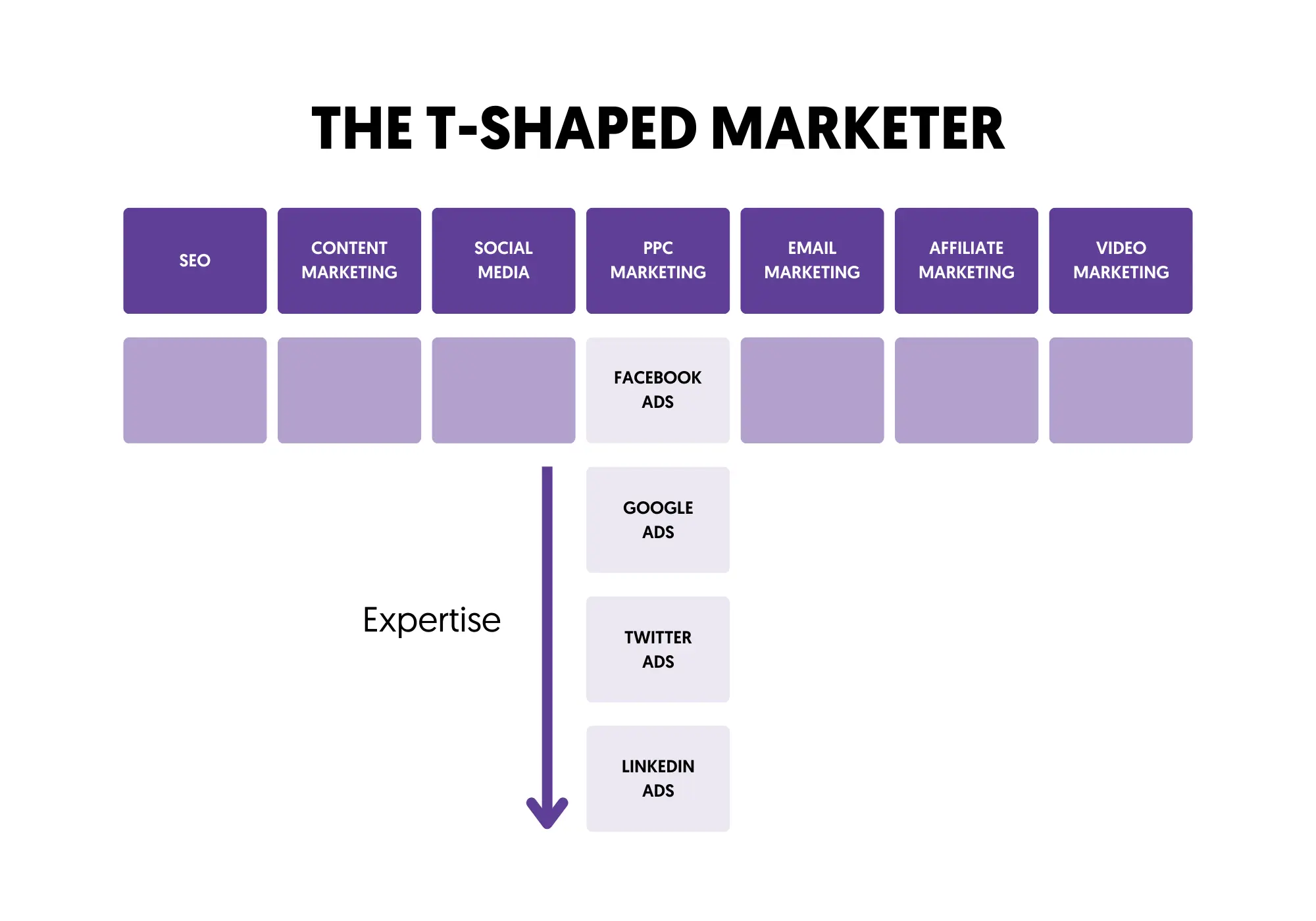
Taking a T-shaped approach to marketing, which involves specializing in one specific area before expanding into other digital marketing landscapes, can make you a more compelling job candidate.
You may choose to specialize in SEO before expanding into content marketing or PPC campaigns, for instance.
There are plenty of courses and certifications online that focus on specific marketing skills, such as social media or website analytics.
7. Network With Other Marketers
The social nature of the digital marketing world makes networking a crucial process for any promotional professional.
The larger your network, the more opportunities you’ll have to find enticing roles. Plus, your network can be a powerful learning resource.
The people you connect with in the marketing field can offer insights into campaigns and strategies you might not encounter in a formal educational program.
Invest in both online and offline networking strategies. In the digital world, you can use social media to engage in discussions with professionals, join forums or groups on LinkedIn, and attend virtual events.
In the offline world, attending marketing events, interacting with people in professional settings, and attending job fairs can be extremely useful.
You could even seek out a professional mentor to help guide you through the process of building your marketing career.
8. Keep Learning New Skills
Finally, even once you’ve earned your first role as a digital marketer, it’s important to take a lifelong approach to learning.
In this industry, strategies and methodologies constantly evolve as the digital world and consumer preferences change.
There’s always something new to learn about digital marketing, whether discovering how to use AI in your campaigns or exploring the latest SEO algorithms.
Staying updated with webinars, videos, podcasts, and newsletters can be extremely useful.
It’s also worth constantly looking for new courses and certifications to make you more valuable to your employer. For instance, you can take specialist courses to guide you through the process of using new digital marketing software or tools.
Digital Marketing Jobs You Can Do
As a digital marketing professional, you can work in different roles. The most popular are:
Digital Marketing Specialist – Digital marketing specialists are professionals with various skills, covering everything from SEO to PPC marketing. They often manage and work alongside various members of a digital marketing team and coordinate campaigns.
Digital Marketing Manager – As a digital marketing manager, you’ll take on a leadership role within the promotional landscape, overseeing the work of other professionals. You’ll design campaigns, guide strategies, and report on marketing ROI.
SEO Specialist – SEO specialists focus exclusively on marketing strategies that improve a company’s position on the search engine result pages. They work on backlink strategies, keyword research, and even technical SEO.
PPC Specialist – As a PPC specialist, you’ll concentrate on paid advertising strategies, bidding for keywords, creating marketing copy, and analyzing research. You may also work with social media managers on paid social strategies.
Email Marketer – Email marketers focus on capturing customers with lead magnets and landing pages, segmenting audiences, and creating email content. They nurture consumers over time and build deeper relationships with audiences through newsletters.
Content Marketing Specialist – Content marketing specialists focus on creating content throughout the purchasing journey. They may create eBooks, articles, blog posts, social media content, and even copy for email strategies.
eCommerce Specialist – As an eCommerce specialist, you’ll focus on working with sales teams to generate leads for an online store. You’ll create copy for sales campaigns, write product descriptions, and use various other marketing methods to boost awareness.
Social Media Manager – Social media managers focus on strengthening a company’s presence online through social media channels. You may work on multiple different platforms, using video, visual content, and written campaigns.
You can also start your own digital marketing agency or become a digital marketing consultant and offer consulting services to other companies.
How Much Do Digital Marketers Make?
The average earnings of a digital marketer can vary depending on the nature of your role. Most professionals in the United States earn an average of $75,000 annually in marketing roles.
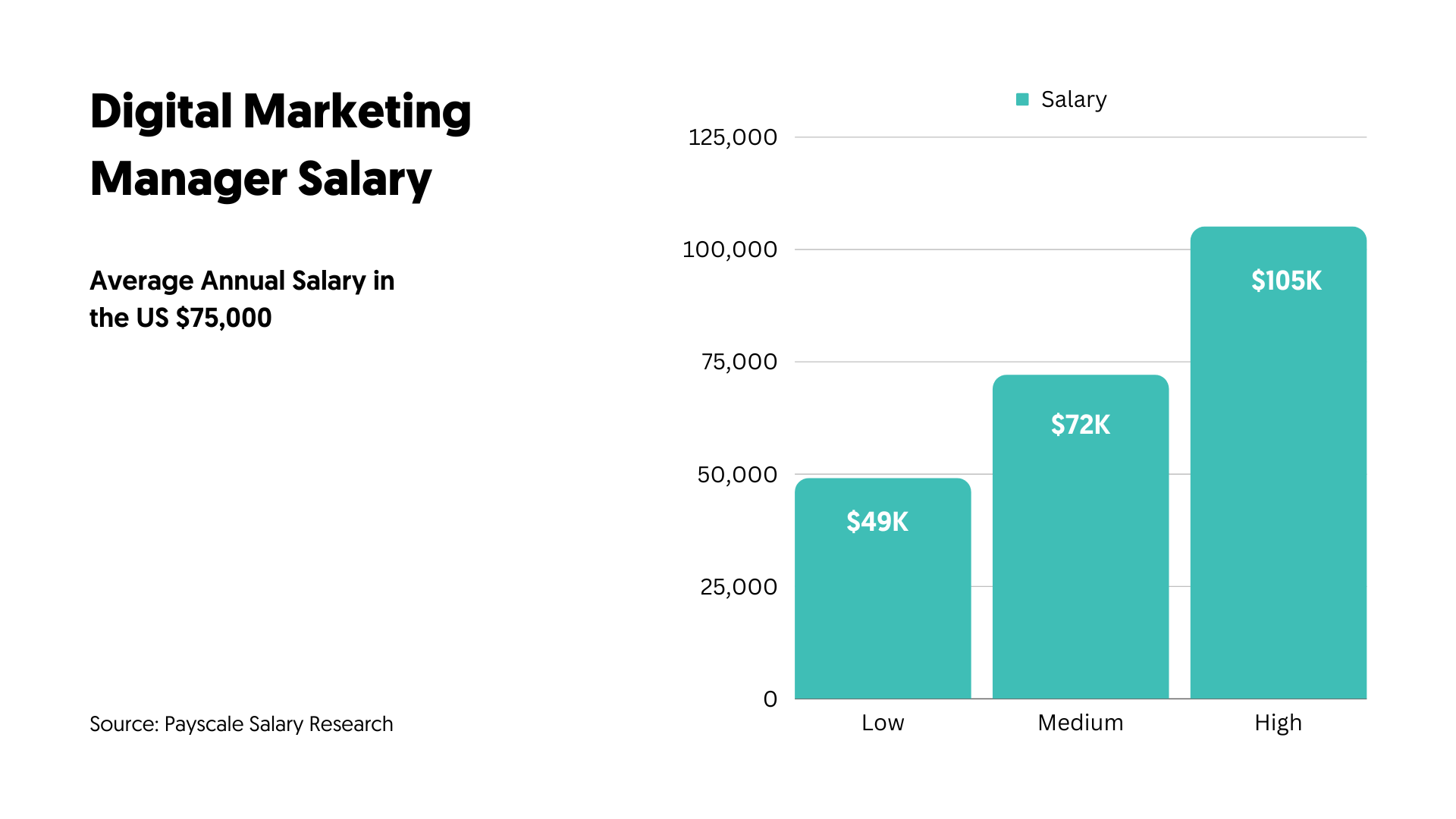
However, your salary could vary depending on your experience level and location.
What’s more, you could earn more if you explore the freelance world, where you can set your own rates for different marketing activities.
Notably, the Bureau of Labor Statistics suggests that opportunities in the marketing field will likely increase by around 10% by 2031.
Conclusion
Digital marketers are the professionals responsible for helping to generate leads and increase brand awareness for companies in today’s online world.
Working with a wide range of channels, platforms, and strategies, these professionals enjoy fast-paced, interesting, and often lucrative careers. As the competitive digital landscape continues to evolve, demand for digital marketers will likely increase.
If you’re looking for a role that allows you to leverage both your creative and analytical skills, a position as a digital marketer could be an excellent opportunity for you.
